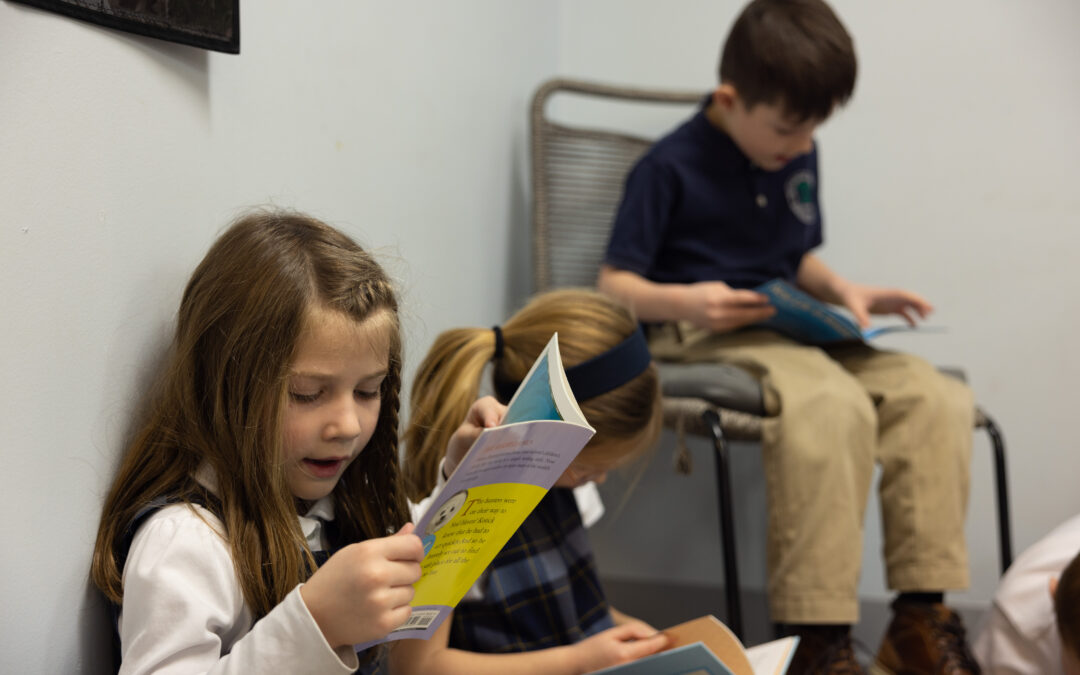The learning to read process follows 6 steps.
- Learn to recognize the vowels and their sounds- a, e, i, o, u
- Learn to recognize the consonants and their sounds. The consonants are all the letters of the alphabet that are not vowels.
- Learn to blend two letters together (a consonant with a short vowel, then a consonant with a long vowel). For example: blend the letter t with all the vowels: ta, te, ti, to, tu
- Learn to sound out one-vowel words, emphasizing the blend first, then the last consonant. Teach the one-vowel rule: “When there is one vowel in a word, it usually says its short sound.” For example: ta-p, tap li-d, lid It a less effective method to have the student sound out each letter t-a-p then say “tap.”
- Learn the sounds of the long vowels and the two-vowel word rule. “When there are two vowels in a word, the first one is long, the second one is silent.”
- Learn and apply all the phonetic special sounds, and apply them in words, along with the one and two vowel word rules. For example: br, st, spl, str, etc.
Common Concerns/Questions When Teaching Your Child to Read
My child can blend a consonant and a vowel together (ex: ha, he, hi, ho hu), but when they go to read a word, they revert to sounding out each individual sound, h-a-t, instead of ha-t. Why are they doing this?
This is extremely common and purely developmental. If you are regularly practicing, you cannot make it happen any faster than it’s going to. It does not mean that your child is behind or struggling. It simply means they need more practice. That’s it! When you approach a word, cover the end of the word and tell them, “Say the blend first.”
For example: hat. Cover the -t. Show them “ha” and remind them to say the blend “ha.” Then have them add the -t. It just takes more practice.
When sounding out a sentence, my child just read the word “bike” in the last sentence but when they get to it again, just a few words later, they don’t remember it as “bike” and have to re-sound it out. They even do this with sight words they know! I think there’s something wrong with them and maybe it’s a learning disability or processing issue.
This is 100% expected and normal. You may have had experience with another child who could read the word once earlier in the page, come to it again, and remember it from when they read it the first time. That kind of experience is the exception, NOT the norm. It does not mean that child is gifted and the other child is struggling. It’s simply how their brain approaches the reading process.Do not frustrate or chide the child who “forgets” a word they just read. Their brain is working overtime just trying to decode. All their mental energy is going towards decoding, not towards memory and comprehension. The more you chide with, “You JUST read this word,” the more stress you place on them which actually impedes their ability to decode.
Why can my child sound out/read single words on a flashcard or written on paper, but when they are put into a sentence, they either cannot read it, or they meltdown?
This is completely normal and we actually expect this to happen. Think of training your physical body to do something hard. All your body is thinking of is the task at hand and its difficulty. It’s not projecting into a larger job or race in the future. It’s doing only what it can do in the moment. Same goes for reading. Again, your child is putting all their energy into decoding because that is where they are in their reading development. It takes so much effort to decode each word at this stage. BE GRACIOUS and KIND. When they see one isolated word their brain sees an end in sight and they can concentrate all their effort right in front of them. As soon as you string words together (even words they can decode and read) it adds many other factors to the reading. Eye tracking, memory, looking ahead while still decoding in front of you, etc. It’s presenting multiple steps even though they are only decoding one thing at a time.Again, do not frustrate or chide them for not being able to reading smoothly. Don’t require them to know what they just read, go back, and say it more fluently. This is incredibly discouraging. Instead, do this….
-
- Encourage your child to work through the sentence, decoding each word as needed. Some students will want to decode a word or two, then go back and try to smoothly read those 2-3 words, and then keep on decoding the next words. But many students will not be able to do this. They want to “read smoothly” but developmentally their ability to go back and read smoothly cannot kick in until the decoding becomes more automatic. Re-read the words for them so they can continue on. Example: Mike sat in the red boat. Child slowly decodes “mi-ke” “sa-t” “in”, and they go back to start over and get a running start “Mike sat in,” but most of the time they can’t remember Mike or sat because the last word they read was “in.” This is where they meltdown, cry, or say, “I can’t do this.” When you see them going back to re-read, help them. Say to them, “Great job. Mike sat in…. keep going.”
- Once child decodes, YOU read the sentence smoothly FOR them. Then encourage them to say it WITH you smoothly. This gives them practice with fluency without the painstaking effort to decode on top of it. Do not force them to decode, decode, decode, decode, until they can read it smoothly. You will frustrate them and kill their love for the reading process.
My child cannot answer one question about something they JUST read.
This will be the case until your child is a fluent reader who no longer decodes words. Do not test your child’s comprehension on words, sentences, and stories they are working hard to decode. Test comprehension on things that YOU read ALOUD. Read your child lots of good literature. Don’t ask them questions, instead say, “Tell me about the story I just read.” Or, “What’s something you can remember about this story.” You will be SHOCKED at the detail they can remember.
My child still cannot determine if a letter is b or d. I think they are dyslexic.
This is a common assumption about letter reversals in reading and writing, but it’s the wrong conclusion to instantly jump to. There are many students with dyslexia who have never once struggled with b and d reversals. Letter reversals in reading and writing are not even considered a concern until after 3rd grade. Gently and calmly correct or guide.
All the other kids seem to be catching on to reading, but my child is not. What is wrong?
Chances are nothing is wrong! Reading is almost entirely developmental. You cannot speed it up any faster than your child’s brain is ready to go. The more you force them, the more you grow a distaste in learning and a distaste for doing hard things. This does not mean you don’t work through their lessons and require them to finish their work. It just means to do not add undo stress and anxiety if it is not clicking as fast as you want it to click.Is reading hard? Yes. Absolutely.
Affirm that for your child when they say things like that.
“You are right! This is a really hard thing, but you CAN do hard things.” And it might just be the hardest thing on the planet, but keep a soft tone and a smile, especially when they are angry, melting down, or giving up. When you match his/her frustration with yours, or his/her anger with yours, you fuel the fire instead of putting it out.
If your child is still working really hard to decode and a lesson seems long, split it up! Do half of the reading, or half of the phonics lesson. Then move onto another subject and come back to it. Or, wait several hours and come back to finish the rest.
And remember, this too shall pass, and your child will be reading in no time!


